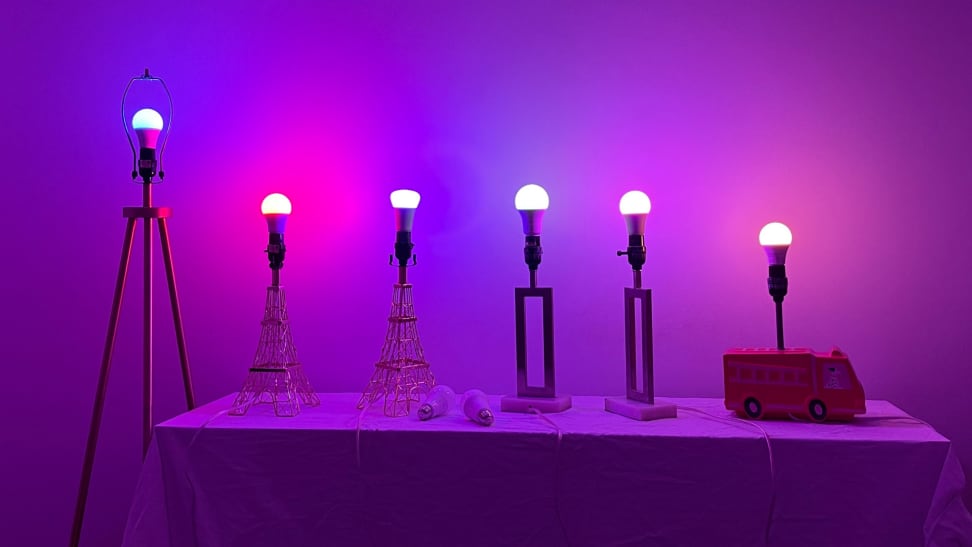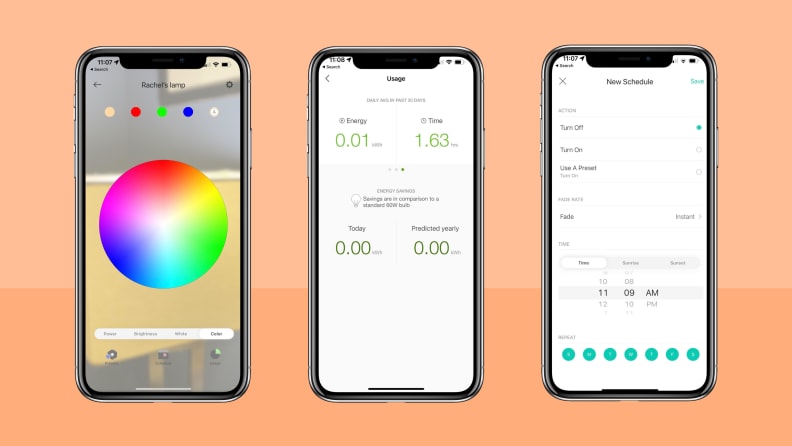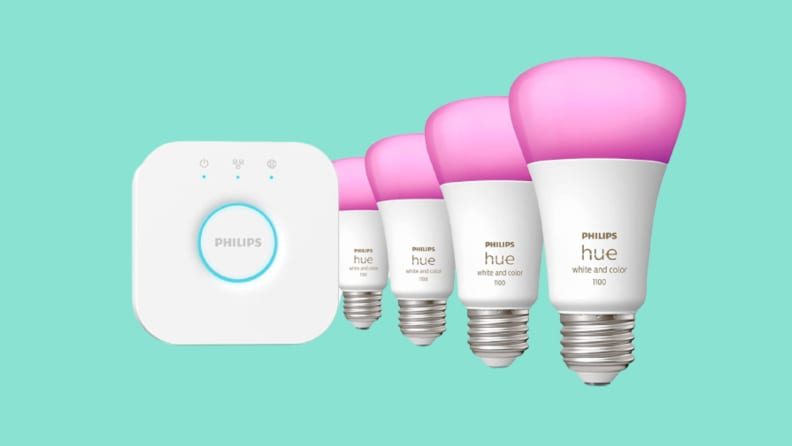 Credit:
Reviewed / Rachel Murphy
Credit:
Reviewed / Rachel Murphy
Products are chosen independently by our editors. Purchases made through our links may earn us a commission.
If you’re thinking about dipping your toe into the world of smart products, a smart light bulb is a great place to start. These gadgets are inexpensive and simple to incorporate into your home, yet they offer a variety of useful features that you can use on a daily basis.
Before you purchase your first smart light bulb, here’s everything you need to know about these internet-connected devices, including the benefits and downsides, how to install them, and more.
What does a smart light bulb do?

Smart bulbs like Kasa allow you to choose from millions of colors, set schedules, and even check energy insights.
Smart light bulbs allow you to remotely control a light in your house via Bluetooth and/or Wi-Fi. Once the bulb is connected to your smartphone, you can turn it on or off through the app, and most smart bulbs can also be controlled via voice commands through digital assistants like Alexa or Google Assistant. Plus, if the light fixture is hooked up to a switch in your home, you can also control it the old-fashioned way.
However, that’s not all smart bulbs can do. Many bulbs also allow you to change the color of the light, choosing from millions of different shades—even white bulbs generally offer several shades of light to suit your space.
Additionally, smart bulbs often offer features such as “Vacation mode,” where they turn on and off randomly throughout the day to make it look like someone is at home.
Other bulbs, like Kasa smart bulbs, have energy monitoring features or other handy functionality via their associated app.
$19 at Amazon with on-page coupon
What’s the difference between a smart light and a smart bulb?
Smart light bulbs and smart lights are similar products, and they generally offer the same features—remote app control, adjustable light color, and so on. However, a smart light is an entire light fixture, whereas a smart bulb is, well, just the bulb.
Smart bulbs tend to be the more affordable option, and the benefit is that you can use them in your existing light fixtures. However, if you’re in the market for a whole new light, a smart light isn’t a bad choice either.
Just keep in mind that many smart light fixtures don’t have replaceable bulbs, which means you’ll need to purchase a whole new unit when its bulb eventually burns out. This likely won’t happen for many years, though, as LED bulbs can often last for up to 100,000 hours.
How do you install a smart light bulb?
One of the best things about smart light bulbs is that they’re quick and easy to install. The installation process may vary slightly based on the product, but in general, all you have to do is screw the bulb into the light. Once you supply power to the fixture, you’ll be able to connect the bulb to your smartphone, and just like that, your new smart bulb is ready to go.
It’s worth noting that some smart light bulbs—such as the Philips Hue—require a hub to operate. This can add a few additional steps to the setup process, but we’ve found the process is still fairly straightforward. If this seems too complicated, rest assured there are plenty of high-quality smart bulbs that don’t need a hub to operate.
Can smart light bulbs be used in any fixture?
Smart bulbs can be used in virtually any modern light fixture, assuming they’re the right shape and size for the light. Standard A19 bulbs, which are suitable for all sorts of indoor lamps and lighting fixtures, are the most common size for smart bulbs.
However, if your light requires a specialty bulb, such as an R20 or floodlight bulb, you’ll need to find a smart product in that particular size. The good news is that brands like GE and Philips Hue offer smart bulbs in most common sizes, allowing you to turn almost any light into a smart fixture.
What are the disadvantages of smart bulbs?
As with any smart home product, there are certain downsides to installing smart bulbs in your home. One of the biggest disadvantages is the cost—smart bulbs are significantly more expensive than regular LED bulbs, so it can get pricey if you want to install several in your home.
For comparison, you can buy a 12-pack of regular GE light bulbs for less than $20, while inexpensive smart bulbs, such as the WiZ Bulbs, generally cost around $10 to $15 a piece.
Another downside to smart light bulbs is that they’re “vampire devices.” They’re not going to drink your blood at night, but they do still draw a small amount of energy when they’re turned off.
This is because they have to stay connected to Bluetooth and/or Wi-Fi to be able to respond to commands from your app or smart assistants.
It’s generally a negligible amount of power, though—it’s highly unlikely you’d notice any change in your electricity bill, and if anything, your bill will go down in the long run thanks to the savings that LED bulbs offer over incandescent ones.
Another thing to consider is that, in order to use smart light bulbs, your light or lamp switch must always be in the "on" position. If the switch accidentally gets shut off, your bulb won't be able to power up.
Finally, just like with any internet-connected device, smart light bulbs have potential to be hacked if not properly secured. For this reason, we always recommend buying from a trusted brand with good security practices and keeping your device’s firmware up to date.
Will smart light bulbs work if the Wi-Fi goes out?
If your Wi-Fi goes out, the smart features of your light bulb won’t work. This means you won’t be able to turn the light on/off via your phone or through a voice assistant.
However, as long as you still have power, you’ll be able to turn the light on and off manually—whether via a wall switch or on the light fixture itself.
What are the best smart light bulbs to buy today?

Philips Hue makes the best smart bulbs. You can use Bluetooth to control them when you're at home, or invest in the Philips Hue hub for remote control.
There are many smart bulbs available today, and the best option for your home depends on factors like your budget, desired features, and existing smart home ecosystem. We’ve tested many of the most popular smart bulbs available today, and our top-recommended product is the Philips Hue Color and Ambiance Starter Kit Not only does it come from one of the most trusted lighting brands, but it’s extremely intuitive to operate and offers a robust set of features.
The downside of Philips Hue bulbs is that they’re more expensive than most and require a hub for operation. If you’re looking for an inexpensive product to test out the technology, we recommend the WiZ Color Smart Bulb, which doesn’t require a hub and comes in several popular bulb sizes. There are also smart bulbs from popular brands like Kasa, Wyze, Cync by GE, and Govee that you may want to consider.


